七年级上册英语unit5知识点归纳
人教版七年级上册英语知识点全第五单元unit5知识点

Unit 5谈论物品所属关系。
1、重点辞汇:do、have、tennis、ping-pong bat、soccer、volleyball、basketball、play、interesting、boring、fun、difficult、relaxing、watch、same...2、soccer ball(英式)足球 a tennis bat一个网球拍baseball bat 棒球拍be late 迟到watch TV 看电视on TV 在电视上play basketball 打篮球play sports 做运动或参加体育比赛3、含有实意动词的一般疑问句的结构及答语。
---Do you /they have a...? e.g. Do they have a basketball?---Yes,I/they do./No,I/they don’t.---Does he /she have a...? e.g. Does she have a new schoolbag?---Yes,he/she does./No,he/she doesn’t.( )----Do you have lunch at home?----___________.A. Yes, I amB. Yes, I canC. Yes, I doD. Yes, I have4、tennis 和tennis ball的区别:tennis指运动项目名称,即“网球运动”。
tennis ball 则指具体的球,有单、复数之分。
e.g. a tennis ball/some tennis balls五、一般此刻时中have的用法和与there be 句型的辨析;have “有”即某物属于某人,表示所属关系,三单形式为has.e.g. I have a blue jacket and my sister has a yellow one.there be “有”主要指的是某地存在某物。
新人教版七年级英语上册 unit 5单词 重点句型 语法解析
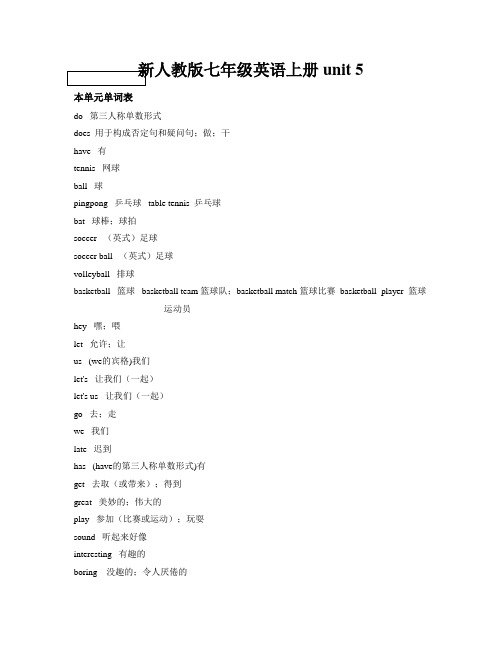
unit 5本单元单词表do 第三人称单数形式does 用于构成否定句和疑问句;做;干have 有tennis 网球ball 球pingpong 乒乓球 table tennis 乒乓球bat 球棒;球拍soccer (英式)足球soccer ball (英式)足球volleyball 排球basketball 篮球 basketball team 篮球队;basketball match 篮球比赛 basketball player 篮球运动员hey 嘿;喂let 允许;让us (we的宾格)我们let's 让我们(一起)let's us 让我们(一起)go 去;走we 我们late 迟到has (have的第三人称单数形式)有get 去取(或带来);得到great 美妙的;伟大的play 参加(比赛或运动);玩耍sound 听起来好像interesting 有趣的boring 没趣的;令人厌倦的fun 有趣的;使人快乐的n.乐趣;快乐difficult 困难的relaxing 轻松的;令人放松的watch 注视;观看TV 电视;电视机 many TVs 很多电视机watch TV 看电视same 相同的love 爱;喜爱with 和......在一起;带有;使用sport 体育运动 play/do/have sports 做运动 sports shoes 运动鞋a sports shoes 体育运动鞋them (they的宾格)他(她、它)们only 只;仅like 喜欢;喜爱easy 容易的;不费力的after 在......以后class 班级;课(近义词:lessen);等级;类别;阶段classmate 同班同学 roommate 室友 workmate 同事 deskmate 同桌schoolmate 校友Bill 比尔(男名)1.on 通过表方位的on的用法,详见unit4【解析】on可以表示“通过;使用……方式”,后面通常接表示通信工具的名词。
最全面人教版七年级上册英语第五单元知识点归纳总结
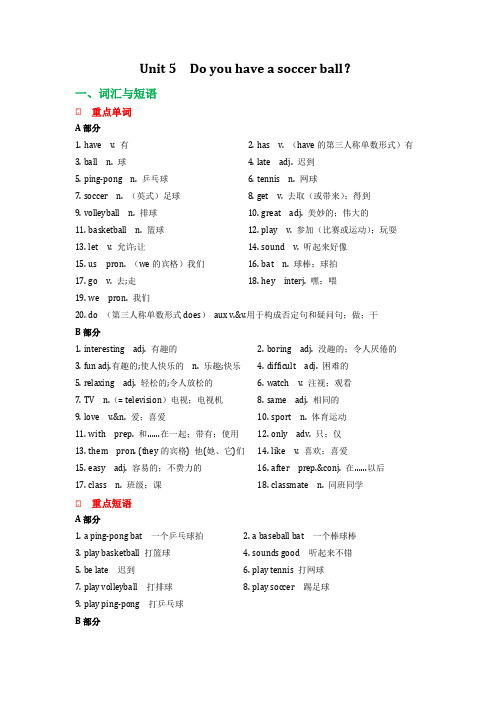
Unit 5 Do you have a soccer ball?一、词汇与短语● 重点单词A部分1.have v. 有2.has v. (have的第三人称单数形式)有3.ball n. 球te adj. 迟到5.ping-pong n. 乒乓球6.tennis n. 网球7.soccer n. (英式)足球8.get v. 去取(或带来);得到9.volleyball n. 排球10.great adj. 美妙的;伟大的11.basketball n. 篮球12.play v. 参加(比赛或运动);玩耍13.let v. 允许;让14.sound v. 听起来好像 pron. (we的宾格)我们16.bat n. 球棒;球拍17.go v. 去;走18.hey interj. 嘿;喂19.we pron. 我们20.do (第三人称单数形式does)aux v.&v.用于构成否定句和疑问句;做;干B部分1.interesting adj. 有趣的2.boring adj. 没趣的;令人厌倦的3.fun adj.有趣的;使人快乐的n. 乐趣;快乐4.difficult adj. 困难的5.relaxing adj. 轻松的;令人放松的6.watch v. 注视;观看 n.(= television)电视;电视机8.same adj. 相同的9.love v.&n. 爱;喜爱10.sport n. 体育运动11.with prep. 和……在一起;带有;使用12.only adv. 只;仅13.them pron. (they的宾格) 他(她、它)们14.like v. 喜欢;喜爱15.easy adj. 容易的;不费力的16.after prep.&conj. 在……以后17.class n. 班级;课18.classmate n. 同班同学● 重点短语A部分1.a ping-pong bat 一个乒乓球拍2.a baseball bat 一个棒球棒3.play basketball 打篮球4.sounds good 听起来不错5.be late 迟到6.play tennis 打网球7.play volleyball 打排球8.play soccer 踢足球9.play ping-pong 打乒乓球B部分1.play computer games 玩电脑游戏2.play volleyball 打排球3.go to the same school 上同一所学校4.watch TV 看电视5.sound interesting 听起来很有趣6.at school 在学校7.with them 和他们一起8.with our friends 和我们的朋友9.watch them on TV 在电视上看它们10.after class 下课后11.watch sports 看体育运动12.in the same school 在同一所学校13.play sth. with sb. 和某人玩某物14.love sports 喜爱运动● 重点句子A部分1.--Do you have a ping-pong bat? --No, I don't.你有一个乒乓球拍吗?不,我没有。
七年级英语上册unit5知识点总结
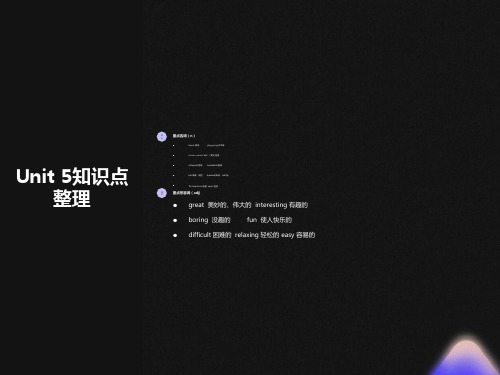
2、A:Let’s play basketball!
让我们去打篮球吧! B:That sounds good/interesting. 那听起来不错/是有趣的!
play+球类运动 玩/打……球类
eg:play ping-pong 打乒乓球 play tennis ball 打网球
I don’t have a soccer ball,but my brother Alan does.
eg:Math is difficult for Jenny. 数学对于Jenny来说是困难的。
英语对于他来说是有趣的。
01
它对于我来说是容易的。 after class 课后 after school 放学后
02
1、Let sb do sth 让某人做某事 注:sb为人称代词的宾格 do为动词原形 eg: Let us go =let’s go 让我们一起走 Let us play=Let’s play 让我们一起玩 Let us ask=Let’s ask 让我们一起去 问 Let me get it. 让我去取它 Let them play ping-pong ball.
01
02
Unit 5知识点整理
三、实义动词have的各种句型变法
结构为:Do/Does+主+have+其它? 肯回: Yes,主+do/does 否回:No,主+don’t/doesn’t
01
02
01
02
eg:1、I have a baseball.
四、重点句式、短语
我没有一个足球,但我的兄弟Alan有。
eg:I h5、go to the same school. 去相同的学校 6、with 介词 和……一起 and 连词 和 eg: My classmates and I play ping-pong. 我的同班同学和我打乒乓球。 I play ping-pong with my classmates. 我打乒乓球和我的同班同学。 7、Sth+be+形容词+for+sb 某物对于某人来说是……样的
人教版七年级英语上册Unit5短语、句型、知识点总结

Unit 5知识点汇总三、语法1.do/does助动词在一般现在时的否定句和疑问句中,帮助实意动词构成疑问句或否定句,其后的动词为动词原形。
如果主语是第三人称单数,用does.陈述句:I have a volleyball. 一般疑问句:Do you have a volleyball? 否定句:I don’t have a volleyball.He likes football. Does he like football? He doesn’t like football.2.have v. 第三人称单数用has。
如:1) She has a very nice room. 2) She doesn’t have a very nice room.3.let v. 让;允许主要结构为:let sb. do sth. “让某人做某事”。
eg: Let me get it.否定形式:let sb not do….“让某人不要做某事”。
eg: Let’s not play basketball. let后的动词用原形。
Let us…=Let’s…eg: Let’s go home. 我们回家吧。
Let’s play basketball. 我们打篮球吧。
4.well adv. 好;满意地;水平高well和good都表示“好”。
但good是形容词,修饰名词;而well是副词,用来修饰动词、形容词和副词。
eg:She is a good painter. 他是一个好画家。
She sings very well. 她唱得非常好。
5.sound n. v. 听起来;似乎: 其后常接形容词eg:That sounds great! 这听起来好极了!6.like v. 喜欢常用短语:like to do…/ like doing…eg:He likes playing football. 他喜欢踢足球。
7. interesting adj. 有趣味的;interested adj感到有趣的. 常用短语be interested in…表示“对……感兴趣”eg:1) The film is very interesting. 2)I am interested in singing and dancing.。
七年级上册英语第五单元知识点

七年级上册英语第五单元知识点本文将介绍七年级上册英语的第五个单元的知识点,包括单词、词组、语法以及阅读理解方面的内容。
一、单词与短语1. offer - 提供2. accept - 接受3. refuse - 拒绝4. polite - 有礼貌的5. impolite - 不礼貌的6. conversation -对话7. invitation - 邀请8. excuse - 借口9. greet - 问候10. introduce - 介绍二、语法知识1. 主语和谓语:在句子中,主语是指动作的执行者,谓语则说明主语的动作。
比如,“Tom plays basketball。
”中,“Tom”就是主语,“plays”就是谓语。
2. 情态动词:情态动词包括can、must、should、may等,用于表示说话人的态度或情感。
例如,“I can play the violin well.”中,“can”表示说话人能够演奏小提琴的能力。
3. 一般现在时:一般现在时用于描述现在的行为或习惯。
例如,“He always studies hard.”中,“studies”是动词的一般现在时。
三、课文阅读课文介绍了两位年轻人在餐厅用餐的情景,主要体现了交际用语方面的知识。
通过课文的学习,学生可以掌握在餐厅点餐、交流的常用语言和表达方式。
四、阅读理解以下是一篇阅读理解文章:John is an American boy. He comes to China with his parents. He wants to make friends with Chinese children. One day, he meets Chen Jie on his way to school. Chen Jie invites John to her home.John's mother tells him to bring some presents when he visits a Chinese family. So, John goes to a store near his hotel and buys some Chinese silk and tea. He puts the presents into his bag. When he arrives at Chen Jie's home, he gives the presents to her parents and says "They are for you." They are very happy and thank him.1. Who does John come to China with?A. His friendsB. His parentsC. His teacherD. His classmates2. What does John buy for Chen Jie's family?A. Some booksB. Some Chinese silk and teaC. Some toysD. Some food3. What do Chen Jie's parents say to John?A. They refuse the presents.B. They don't want to be John's friend.C. They are very happy and thank him.D. They ask John to leave.通过这篇阅读理解文章,学生可以训练自己的阅读理解能力,提高阅读理解的准确度和速度。
人教版英语七年级上册Unit5知识点总结
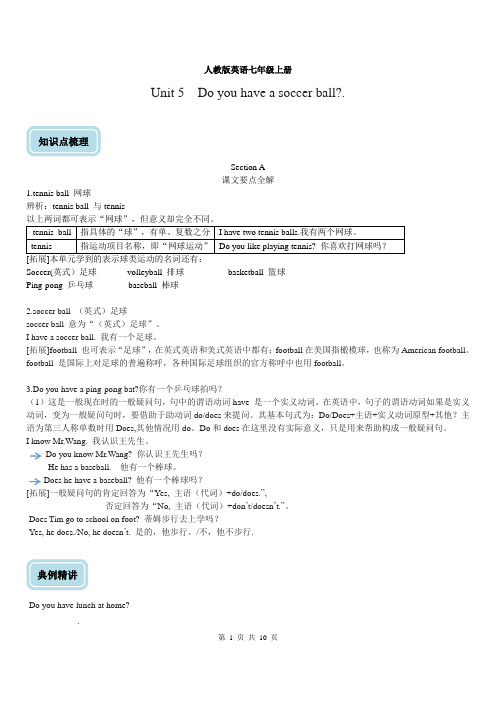
人教版英语七年级上册Unit 5 Do you have a soccer ball?.知识点梳理Section A课文要点全解1.tennis ball 网球辨析:tennis ball 与tennis以上两词都可表示“网球”,但意义却完全不同。
[拓展]本单元学到的表示球类运动的名词还有:Soccer(英式)足球volleyball 排球basketball 篮球Ping-pong 乒乓球baseball 棒球2.soccer ball (英式)足球soccer ball 意为“(英式)足球”。
I have a soccer ball. 我有一个足球。
[拓展]football 也可表示“足球”,在英式英语和美式英语中都有;football在美国指橄榄球,也称为American football。
football 是国际上对足球的普遍称呼,各种国际足球组织的官方称呼中也用football。
3.Do you have a ping-pong bat?你有一个乒乓球拍吗?(1)这是一般现在时的一般疑问句,句中的谓语动词have 是一个实义动词。
在英语中,句子的谓语动词如果是实义动词,变为一般疑问句时,要借助于助动词do/does来提问。
其基本句式为:Do/Does+主语+实义动词原型+其他?主语为第三人称单数时用Does,其他情况用do。
Do和does在这里没有实际意义,只是用来帮助构成一般疑问句。
I know Mr.Wang. 我认识王先生。
Do you know Mr.Wang? 你认识王先生吗?He has a baseball. 他有一个棒球。
Does he have a baseball? 他有一个棒球吗?[拓展]一般疑问句的肯定回答为“Yes, 主语(代词)+do/does.”,否定回答为“No, 主语(代词)+don’t/doesn’t.”。
-Does Tim go to school on foot? 蒂姆步行去上学吗?-Yes, he does./No, he doesn’t. 是的,他步行。
七年级上册英语unit5知识点
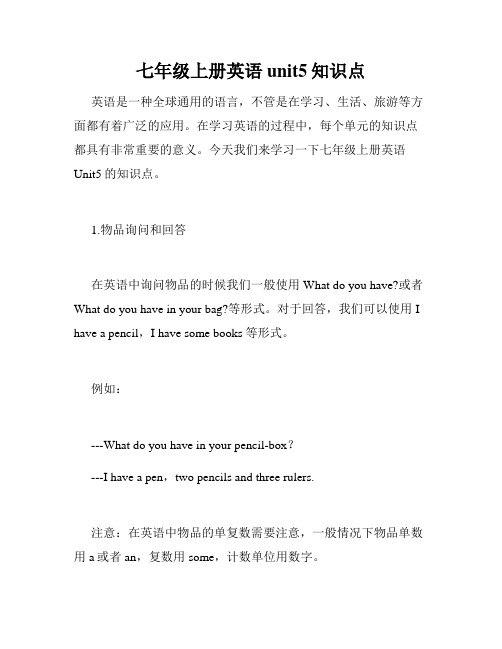
七年级上册英语unit5知识点英语是一种全球通用的语言,不管是在学习、生活、旅游等方面都有着广泛的应用。
在学习英语的过程中,每个单元的知识点都具有非常重要的意义。
今天我们来学习一下七年级上册英语Unit5的知识点。
1.物品询问和回答在英语中询问物品的时候我们一般使用What do you have?或者What do you have in your bag?等形式。
对于回答,我们可以使用I have a pencil,I have some books等形式。
例如:---What do you have in your pencil-box?---I have a pen,two pencils and three rulers.注意:在英语中物品的单复数需要注意,一般情况下物品单数用a或者an,复数用some,计数单位用数字。
2.价格询问和回答在英语中询问价格,我们一般使用How much is…?或者How much are…?等形式。
对于回答,我们可以使用It’s…,They’re…等形式。
例如:---How much is the T-shirt?---I t’s twenty dollars.---How much are these pants?---They’re thirty dollars.注意:在英语中有些物品是不可数名词,比如水、米、面包等,不能直接使用a或者an,甚至连some都不可以。
询问这些物品的时候需要用到How much或者How many等疑问词。
3.物品归属询问和回答在英语中询问物品归属的时候我们一般使用Whose…is…?或者Whose…are…?等形式。
对于回答,我们可以使用It’s…(s)或者They’re…(s)等形式,其中s表示所有格。
例如:---Whose backpack is this?---It’s Maria’s backpack.---Whose shoes are these?---They’re his shoes.注意:在英语中所有格的形式是在名词末尾加上s或者’,如Tom’s bag、the teacher’s book等。
- 1、下载文档前请自行甄别文档内容的完整性,平台不提供额外的编辑、内容补充、找答案等附加服务。
- 2、"仅部分预览"的文档,不可在线预览部分如存在完整性等问题,可反馈申请退款(可完整预览的文档不适用该条件!)。
- 3、如文档侵犯您的权益,请联系客服反馈,我们会尽快为您处理(人工客服工作时间:9:00-18:30)。
七年级上册英语unit5知识点归纳本文将对七年级英语上册Unit5的知识点进行归纳总结,方便同学们学习和复习。
一、单词及词组
1. hobby 爱好
2. collection 收藏品,收集
3. stamp 邮票
4. postcard明信片
5. coin 硬币
6. toy 玩具
7. comic book 漫画书
8. play computer games 玩电脑游戏
9. take photos 拍照片
10. do puzzles 做拼图
11. play chess 下棋
12. listen to music 听音乐
13. be interested in 对…感兴趣
14. be crazy about 对…痴迷
15. be good at 擅长于
二、重点语法
1. 一般现在时
The boy collects postcards. 这个男孩收集明信片。
She likes listening to music. 她喜欢听音乐。
2. 一般现在时的疑问句及否定句
Does he play computer games? 他玩电脑游戏吗?
She doesn't do puzzles.她不做拼图。
3. be interested in 和 be crazy about 的用法
I am interested in playing chess. 我对下棋感兴趣。
She is crazy about collecting stamps. 她对收集邮票痴迷。
4. be good at 的用法
He is good at playing basketball. 他擅长于打篮球。
My sister is good at taking photos. 我妹妹擅长于拍照片。
三、常用句型
1. What do you like doing in your free time? 你空闲时间喜欢做什么?
2. Do you collect anything? 你收集什么?
3. How often do you play computer games? 你多久玩一次电脑游戏?
4. I am interested in reading books. 我对读书感兴趣。
5. She is crazy about playing volleyball. 她对打排球痴迷。
6. He is good at drawing pictures. 他擅长于画画。
四、文化知识
1.苏格兰爱丁堡
2.爱沙尼亚塔林
3.英语制度
五、学习建议
1. 多认识不同的单词并尝试运用它们。
2. 练习使用一般现在时,多构造句子。
3. 多尝试运用句型,可以和同学进行对话。
本文对七年级英语上册Unit5的知识点进行了总结归纳,希望同学们能够借此加深对学科知识的认识和理解,更好地学习和运用英语。
